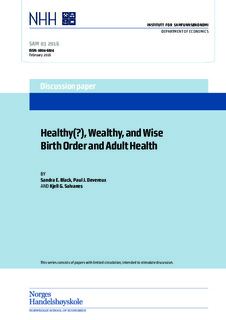Healthy(?), Wealthy, and Wise Birth Order and Adult Health.
Working paper

Åpne
Permanent lenke
http://hdl.handle.net/11250/2378936Utgivelsesdato
2016-02-12Metadata
Vis full innførselSamlinger
- Discussion papers (SAM) [657]
Sammendrag
While recent research finds strong evidence that birth order affects children’s outcomes such as education, IQ scores, and earnings, the evidence for effects on health is more limited. This paper uses a large dataset on the population of Norway and focuses on the effect of birth order on a range of health and health-related behaviors, outcomes not previously available in datasets of this magnitude. Interestingly, we find complicated effects of birth order. First-borns are more likely to be overweight, to be obese, and to have high blood pressure and high triglycerides. For example, compared to second-borns, first-borns are 4% more likely to be overweight, 2% more likely to be obese, 3% more likely to have high blood pressure, and 2% more likely to have high
triglycerides. So, unlike education or earnings, there is no clear first-born advantage in health. However, later-borns are more likely to smoke (first-borns are 5% less likely to smoke daily than second-borns) and are less likely to report good physical and mental health (the difference between a first- and second-born is about 1.5%). They are also less likely to report that they are happy (2% difference between first- and second-borns). We find that these effects are largely unaffected by conditioning on education and earnings, suggesting that these are not the only important pathways to health differentials by birth order. When we explore possible mechanisms, we find that early maternal investment may play a role in birth order effects on health.